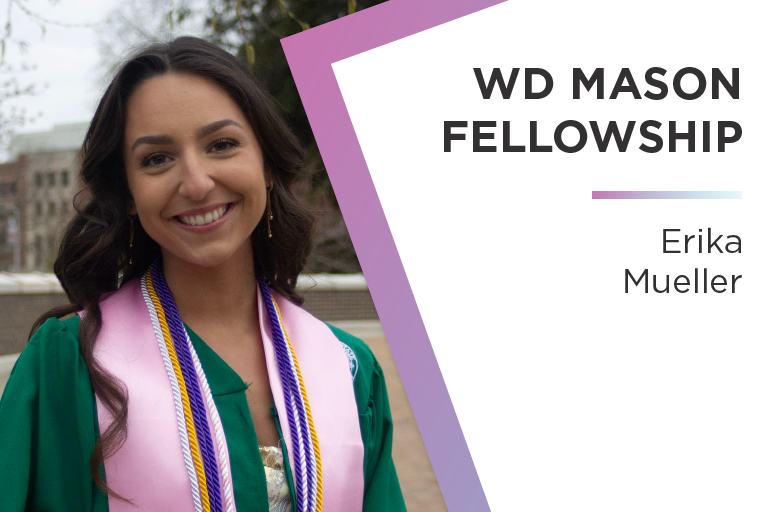Erika Mueller (’22) is a first-generation college student pursuing her Master’s in Speech Language Pathology. With the help of the WD Mason Fellowship, Mueller conducts research in the Spartan Stuttering Lab and aspires to help others with communication and fluency disorders.
When Erika Mueller was 14 years old, her family moved to Ohio. To her, Michigan was still home — and Mueller knew, without question, that she wanted to attend Michigan State University for her undergraduate degree. But that’s as far as it went. At first, Mueller didn’t know what to study.
“I originally came in with a plan: I was going to major in neuroscience, I wanted to go med school, then I thought about nursing school, then I thought about business — I had no idea what I wanted to do,” she said of her first year. “I was really lost, and overall, not doing well in school; like socially, academically. It was really hard year.”
As a first-generation college student, Mueller said she didn’t have much guidance when it came to the world of academia, but she never stopped trying to find her calling. Mueller went on to earn her B.S. in Psychology and Communication, with minors in Cognitive Science and Communicative Sciences and Disorders (CSD), and a concentration in Health Communication. It was here that she found her people.
A supportive community
“I had always considered the field of speech language pathology because I’m somebody who has a lisp and I’ve gone to speech language pathologists,” said Mueller. “But I thought, I can’t be in that field, nobody will take me seriously. Like, I would be a joke to everyone, they’re going to know that I have a lisp.”
Mueller was quickly proven wrong. She realized that while speech language pathologists and others in CSD may be the first to recognize her lisp, “This community will always be the last to judge. And I found just such a sense of support and confidence within this field.”
She was ready to pursue a master’s degree. This time, Mueller knew exactly what to study — and where she would do it.
“I’ve had every single possible chance to succeed and do anything that I wanted here in undergrad. The faculty in ComArtsSci have been some of the best people I’ve ever met, and I couldn’t leave that for grad school.”
WD Mason Fellowship
Mueller had always been responsible for supporting herself financially. During her semesters as an undergraduate student, she worked two jobs (with multiple jobs throughout the summer) and used student loans to make up the rest.
“In undergrad … you’re applying to grad school, too, and you have to have everything on your resume, you have to make sure your letters of recommendation are going well, you have to make it to work, and you have a class project due at 4:00 … It’s a lot,” she admitted.
Grad school is still “a lot” for Erika Mueller. In the Speech-Language Pathology program, Mueller has classes two days a week and just began clinical placements three days a week. She is also working on research in the Spartan Stuttering Lab with Professor J. Scott Yaruss, developing her own thesis project, serving on CSD’s Graduate Student Advisory Council … enough to keep her plenty busy without adding multiple jobs to the mix.
Enter Mueller’s advisors and instructors, J. Scott Yaruss and Gregory Spray, who nominated her for the WD Mason Fellowship. Mueller received the award in 2022, allowing her to fully dedicate herself to her studies.
“I was prepared to do that again for grad school, but this fellowship has given me more than I could ever imagine,” said Mueller.
“Erika has been an outstanding member of our lab group since the time of her undergraduate studies,” said Yaruss. “She has taken a leadership role in guiding other students and contributed substantially to our training and research goals. I am thrilled to have her working with us and gratified to see her success in the graduate program.”
Mueller is thrilled, too, and immensely grateful to be chosen for this award. “Working with our faculty has just been the most rewarding experience of my life. It’s given me such incredible research opportunities, and the connections that I’ve formed — with not only the faculty and my professors, but the students in this program — has been more than could have ever expected freshman year.”
Looking forward, Mueller plans to to gain clinical experience for a few years before coming back for her doctorate. In her own career, Mueller hopes to one day instill that same confidence she received from the people in CSD.
— Jessica Mussell
